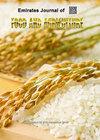Pre-plant application and different weed removal applications and their combinations caused positive effects on yield-related parameters
IF 0.7
4区 农林科学
Q3 AGRONOMY
引用次数: 0
Abstract
In this study, the effect of corn on grain quality was investigated by applying different weed removal processes in corn plant. These, which was repeated for two years, four weed removal treatments [Hand hoe (H), hand and tractor hoe (HT), tractor hoe (T), and no-operation-control (C)] were tested on corn in a pre-treated [radish (R)] and an untreated [no front crop (NR)] field. According to the means of the applications for the years; thousand grain weight (TGW) and weight of ear grain (WEG) values were high in R, H and HT applications, while the lowest values were obtained in control applications. In protein content (PC), it has been noted that R application reduces the PC value while hoe applications gave parallel results with TGW and WEG. Rod ratio on the cob (RRC) and starch content (SC) values were positively affected by R and C applications. Finally, in the oil content (OC) value, it has been seen that the differences in the combination of the applications where the NR and C applications have insignificant but positive effects are more prominent. As a result, while R, H and HT applications and their combinations caused positive effects on yield-related parameters (TGW and WEG), some inconsistencies were observed in quality parameters (OC, SC and PC). It is thought that these discrepancies are caused by changes in the nutrient content of the soil and its acceptability by the plant, influenced by changes in the amount of precipitation. Keywords: agroecology; allelopathy; bio-herbicide; Raphanus sativus; Zea mays L.播种前施药和不同的除草施药及其组合对产量相关参数产生积极影响
本研究通过对玉米植株采用不同的除草工艺,调查了玉米对谷物品质的影响。 在预处理[萝卜(R)]和未处理[无前茬作物(NR)]田块中,对玉米进行了四种除草处理[手锄(H)、手锄和拖拉机锄(HT)、拖拉机锄(T)和不操作控制(C)]试验,试验重复进行了两年。根据各年施药的平均值,R、H 和 HT 施药的千粒重(TGW)和穗粒重(WEG)值较高,而对照施药的值最低。在蛋白质含量(PC)方面,施用 R 会降低 PC 值,而施用锄头的结果与千粒重和穗粒重相同。茎杆比率(RRC)和淀粉含量(SC)值受到 R 和 C 应用的积极影响。最后,在含油量(OC)值方面,可以看出,在 NR 和 C 的应用中,组合应用的差异并不显著,但积极影响更为突出。因此,虽然 R、H 和 HT 应用及其组合对产量相关参数(TGW 和 WEG)产生了积极影响,但在质量参数(OC、SC 和 PC)方面却出现了一些不一致。据认为,造成这些差异的原因是土壤养分含量的变化以及植物对养分的接受能力受到降水量变化的影响。 关键词:农业生态学;等位基因;生物除草剂;Raphanus sativus;Zea mays L.
本文章由计算机程序翻译,如有差异,请以英文原文为准。
求助全文
约1分钟内获得全文
求助全文
来源期刊

Emirates Journal of Food and Agriculture
AGRONOMYFOOD SCIENCE & TECHNOLOGY&nb-FOOD SCIENCE & TECHNOLOGY
CiteScore
1.80
自引率
0.00%
发文量
18
期刊介绍:
The "Emirates Journal of Food and Agriculture [EJFA]" is a unique, peer-reviewed Journal of Food and Agriculture publishing basic and applied research articles in the field of agricultural and food sciences by the College of Food and Agriculture, United Arab Emirates University, United Arab Emirates.
 求助内容:
求助内容: 应助结果提醒方式:
应助结果提醒方式:


